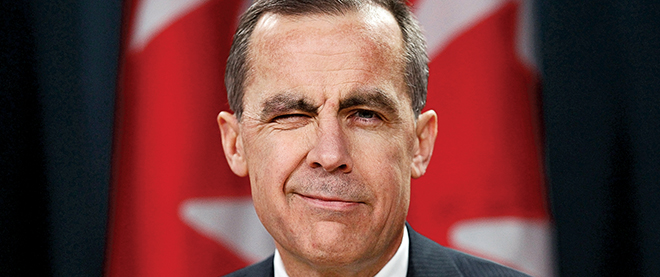Mark Carney, meet the British press
Is Mark Carney a saviour? Or an overpaid foreigner with dubious ideas? Let the sideshow begin.
Chris Wattie/Reuters
Share

Two hours into Mark Carney’s grilling last week by the treasury select committee in London, the future Bank of England governor took a moment to fact check the British press. He denied a report stating he would be meeting with Chancellor of the Exchequer George Osborne while in London. In fact, Carney said with mild annoyance, “No such meeting was ever planned.”
It was a subtle yet instructive moment for Carney, who will face unprecedented media speculation in his new job—arguably the most influential unelected post in Britain. Indeed, the press onslaught is well under way.
When Carney’s appointment was announced last year, the Telegraph, a respected U.K. broadsheet with a conservative bent, immediately dispatched a reporter to his Ottawa house for a quote. Carney reportedly shooed the fellow away with a good-natured, “Give it up.” But you wouldn’t blame him for feeling a bit uneasy. That doorstepping was a harbinger of what was soon to follow.
The following day the paper ran a story about Carney’s wife, Diana, whom they described in a headline as “an eco-warrior who says banks are rotten.” It was a conclusion drawn from several comments Mrs. Carney had made about her support for the Occupy movement and her aversion to shopping. Much hay was made of her website, ecoproductsthatwork.com, on which she discusses such controversial issues as the benefits of coconut fibre versus steel kitchen scrub pads. Within hours of the Telegraph story appearing online, a reporter from the Guardian newspaper called me in London to ask for my opinion on Diana Carney and her environmental website. I had to decline, because I didn’t have one. “But what do Canadians feel about her generally?” the reporter wanted to know.
The answer, of course, was nothing much.
While the average British journalist would undoubtedly view the Canadian media as ludicrously polite (or even irresponsibly complacent) in our tendency to leave the private lives of public figures alone, the British press have a history of crossing the line into dubious territory. Witness the phone-hacking scandal and the resulting Leveson inquiry report (which recommended statutory regulation to bridle an intrusive and at times immoral press), not to mention a long list of influential public figures at Mark Carney’s level brought down as the result of press scrutiny in the past couple of years. For every Bob Diamond, there is a corresponding Andrew Mitchell. Diamond is the Barclays CEO who resigned after it emerged that his employees had manipulated the LIBOR interest rate during his tenure, while Mitchell is the former Tory chief whip who stepped down last year after he was accused of calling a police officer a “pleb,” which he has always denied and which has never been definitively proven. (He is now suing the Sun newspaper, publisher of the initial “scoop.”) A similar career implosion befell George Entwistle late last year when the newly hired BBC director general was pushed into quitting over a news report that wrongly implicated a Thatcher-era cabinet minister in a sex abuse scandal involving children.
Carney will be the subject of obsessive scrutiny, both personal and political. In some ways, his status as an outsider will be an asset. As Peter Preston, former editor-in-chief of the Guardian and media columnist for its sister paper, the Observer, said in an interview, the British press (and public) “tend to like Canadians because they have no clear image of them. Not American; not Brit; not very foreign; mostly affable, intelligent, successful, with a political system we can understand.”
But being Canadian, with its pleasant connotations both cultural and economic, will not be enough to shield him from fallout down the road. “Carney is George Osborne’s personal choice—and Osborne is a contentious, possibly failing figure,” Preston said. “Carney is billed as the world’s best, i.e. a miracle worker, and that’s an awful burden to bear. He stands or falls now by the state of the U.K.’s economy, which may be beyond miracles. If he succeeds, he’ll be George’s success. If he fails, it will be his failure. So he’s in an uncomfortable position—which is bound to interest the very competitive press.”
The tabloids, Preston pointed out, will dissect his personal life—obsessing over his wife’s wardrobe, his choice of house and whether he chooses to send his children to state or private school. The broadsheets will analyze his every public hiccup for the grave ramifications it might have for the future of the British economy. Envious British banking colleagues who might have been governor themselves will add fuel to the flames by sniping from the sidelines. And if the Tories are ousted in 2015, Carney may end up with a chancellor who does not happen to see him as a red-caped super-banker poised to save the battered British economy, but as an over-compensated foreigner with dubious ideas.
As one MP pointed out at the treasury select committee hearing, Carney is not only tasked with resuscitating a country, but living up to his “rock star image” as well. It’s a tall order for a mere mortal, let alone a man who has spent the past five years enjoying a relatively quiet existence in a small, culturally reserved capital like Ottawa.
As Preston says, Carney will need his rumoured superpowers to withstand the pressure. “And all because he’s Canadian? No. Because he’s been talked into taking a job with downsides unlimited.”